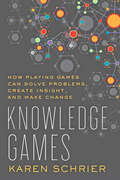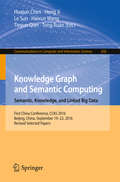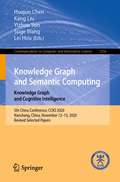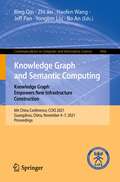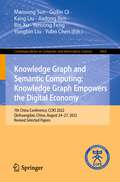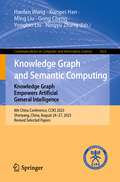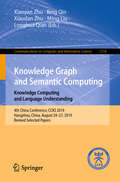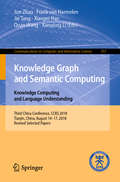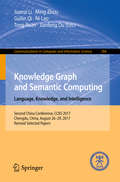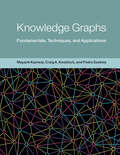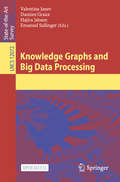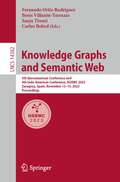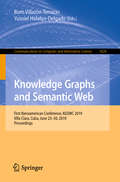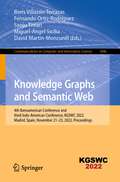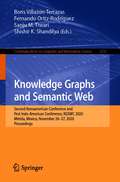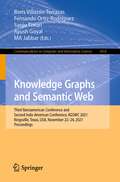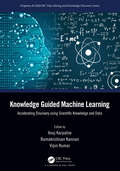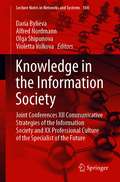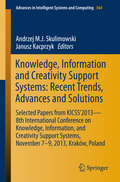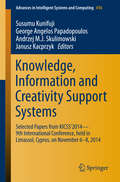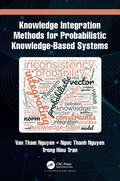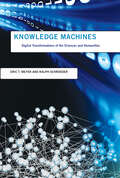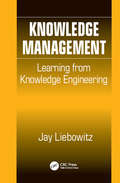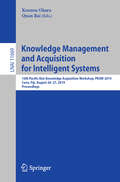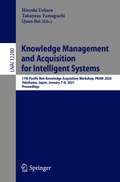- Table View
- List View
Knowledge Games: How Playing Games Can Solve Problems, Create Insight, and Make Change (Tech.edu: A Hopkins Series on Education and Technology)
by Karen SchrierAre games the knowledge-producers of the future?Imagine if new knowledge and insights came not just from research centers, think tanks, and universities but also from games, of all things. Video games have been viewed as causing social problems, but what if they actually helped solve them? This question drives Karen Schrier’s Knowledge Games, which seeks to uncover the potentials and pitfalls of using games to make discoveries, solve real-world problems, and better understand our world. For example, so-called knowledge games—such as Foldit, a protein-folding puzzle game, SchoolLife, which crowdsources bullying interventions, and Reverse the Odds, in which mobile game players analyze breast cancer data—are already being used by researchers to gain scientific, psychological, and humanistic insights.Schrier argues that knowledge games are potentially powerful because of their ability to motivate a crowd of problem solvers within a dynamic system while also tapping into the innovative data processing and computational abilities of games. In the near future, Schrier asserts, knowledge games may be created to understand and predict voting behavior, climate concerns, historical perspectives, online harassment, susceptibility to depression, or optimal advertising strategies, among other things.In addition to investigating the intersection of games, problem solving, and crowdsourcing, Schrier examines what happens when knowledge emerges from games and game players rather than scientists, professionals, and researchers. This accessible book also critiques the limits and implications of games and considers how they may redefine what it means to produce knowledge, to play, to educate, and to be a citizen.
Knowledge Graph and Semantic Computing: Semantic, Knowledge, and Linked Big Data
by Huajun Chen Heng Ji Le Sun Haixun Wang Tieyun Qian Tong RuanThis book constitutes the refereed proceedings of the first China Conference on Knowledge Graph and Semantic Computing, CCKS, held in Beijing, China, in September 2016. The 19 revised full papers presented together with 6 shared tasks were carefully reviewed and selected from numerous submissions. The papers are organized in topical sections on knowledge representation and learning; knowledge graph construction and information extraction; linked data and knowledge-based systems; shared tasks.
Knowledge Graph and Semantic Computing: 5th China Conference, CCKS 2020, Nanchang, China, November 12–15, 2020, Revised Selected Papers (Communications in Computer and Information Science #1356)
by Huajun Chen Kang Liu Yizhou Sun Suge Wang Lei HouThis book constitutes the refereed proceedings of the 5th China Conference on Knowledge Graph and Semantic Computing, CCKS 2020, held in Nanchang, China, in November 2020. The 26 revised full papers presented were carefully reviewed and selected from 173 submissions. The papers are organized in topical sections on knowledge extraction: lexical and entity; knowledge extraction: relation; knowledge extraction: event; knowledge applications: question answering, dialogue, decision support, and recommendation.
Knowledge Graph and Semantic Computing: 6th China Conference, CCKS 2021, Guangzhou, China, November 4-7, 2021, Proceedings (Communications in Computer and Information Science #1466)
by Bing Qin Zhi Jin Haofen Wang Jeff Pan Yongbin Liu Bo AnThis book constitutes the refereed proceedings of the 6th China Conference on Knowledge Graph and Semantic Computing, CCKS 2021, held in Guangzhou, China, in November 2021. The 19 revised full papers and 9 short papers presented were carefully reviewed and selected from 170 submissions. The papers are organized in topical sections on knowledge extraction: knowledge graph representation and reasoning; knowledge acquisition and knowledge graph construction; linked data, knowledge integration, and knowledge graph storage management; natural language understanding and semantic computing; knowledge graph applications: semantic search, question answering, dialogue, decision support, and recommendation; knowledge graph open resources.
Knowledge Graph and Semantic Computing: 7th China Conference, CCKS 2022, Qinhuangdao, China, August 24–27, 2022, Revised Selected Papers (Communications in Computer and Information Science #1669)
by Maosong Sun Guilin Qi Kang Liu Jiadong Ren Bin Xu Yansong Feng Yongbin Liu Yubo ChenThis book constitutes the refereed proceedings of the 7th China Conference on Knowledge Graph and Semantic Computing: Knowledge Graph Empowers the Digital Economy, CCKS 2022, in Qinhuangdao, China, August 24–27, 2022.The 15 full papers and 2 short papers included in this book were carefully reviewed and selected from 100 submissions. They were organized in topical sections as follows: knowledge representation and reasoning; knowledge acquisition and knowledge base construction; linked data, knowledge integration, and knowledge graph storage managements; natural language understanding and semantic computing; knowledge graph applications; and knowledge graph open resources.
Knowledge Graph and Semantic Computing: 8th China Conference, CCKS 2023, Shenyang, China, August 24–27, 2023, Revised Selected Papers (Communications in Computer and Information Science #1923)
by Haofen Wang Xianpei Han Ming Liu Gong Cheng Yongbin Liu Ningyu ZhangThis book constitutes the refereed proceedings of the 8th China Conference on Knowledge Graph and Semantic Computing: Knowledge Graph Empowers Artificial General Intelligence, CCKS 2023, held in Shenyang, China, during August 24–27, 2023. The 28 full papers included in this book were carefully reviewed and selected from 106 submissions. They were organized in topical sections as follows: knowledge representation and knowledge graph reasoning; knowledge acquisition and knowledge base construction; knowledge integration and knowledge graph management; natural language understanding and semantic computing; knowledge graph applications; knowledge graph open resources; and evaluations.
Knowledge Graph and Semantic Computing: 4th China Conference, CCKS 2019, Hangzhou, China, August 24–27, 2019, Revised Selected Papers (Communications in Computer and Information Science #1134)
by Xiaoyan Zhu Ming Liu Bing Qin Xiaodan Zhu Longhua QianThis book constitutes the refereed proceedings of the 4th China Conference on Knowledge Graph and Semantic Computing, CCKS 2019, held in Hangzhou, China, in August 2019. The 18 revised full papers presented were carefully reviewed and selected from 140 submissions. The papers cover wide research fields including the knowledge graph, the semantic Web, linked data, NLP, information extraction, knowledge representation and reasoning.
Knowledge Graph and Semantic Computing. Knowledge Computing and Language Understanding: Third China Conference, CCKS 2018, Tianjin, China, August 14–17, 2018, Revised Selected Papers (Communications in Computer and Information Science #957)
by Jun Zhao Frank Van Harmelen Jie Tang Xianpei Han Quan Wang Xianyong LiThis book constitutes the refereed proceedings of the Third China Conference on Knowledge Graph and Semantic Computing, CCKS 2018, held in Tianjin, China, in August 2018.The 27 revised full papers and 2 revised short papers presented were carefully reviewed and selected from 101 submissions. The papers cover wide research fields including the knowledge graph, information extraction, knowledge representation and reasoning, linked data.
Knowledge Graph and Semantic Computing. Language, Knowledge, and Intelligence
by Juanzi Li Ming Zhou Guilin Qi Ni Lao Tong Ruan Jianfeng DuThis book constitutes the refereed proceedings of the Second China Conference on Knowledge Graph and Semantic Computing, CCKS 2017, held in Chengdu, China, in August 2017. The 11 revised full papers and 6 revised short papers presented were carefully reviewed and selected from 85 submissions. The papers cover wide research fields including the knowledge graph, the Semantic Web, linked data, NLP, knowledge representation, graph databases.
Knowledge Graphs: Fundamentals, Techniques, and Applications (Adaptive Computation and Machine Learning series)
by Mayank Kejriwal Craig A. Knoblock Pedro SzekelyA rigorous and comprehensive textbook covering the major approaches to knowledge graphs, an active and interdisciplinary area within artificial intelligence.The field of knowledge graphs, which allows us to model, process, and derive insights from complex real-world data, has emerged as an active and interdisciplinary area of artificial intelligence over the last decade, drawing on such fields as natural language processing, data mining, and the semantic web. Current projects involve predicting cyberattacks, recommending products, and even gleaning insights from thousands of papers on COVID-19. This textbook offers rigorous and comprehensive coverage of the field. It focuses systematically on the major approaches, both those that have stood the test of time and the latest deep learning methods.
Knowledge Graphs and Big Data Processing (Lecture Notes in Computer Science #12072)
by Valentina Janev Damien Graux Hajira Jabeen Emanuel SallingerThis open access book is part of the LAMBDA Project (Learning, Applying, Multiplying Big Data Analytics), funded by the European Union, GA No. 809965. Data Analytics involves applying algorithmic processes to derive insights. Nowadays it is used in many industries to allow organizations and companies to make better decisions as well as to verify or disprove existing theories or models. The term data analytics is often used interchangeably with intelligence, statistics, reasoning, data mining, knowledge discovery, and others. The goal of this book is to introduce some of the definitions, methods, tools, frameworks, and solutions for big data processing, starting from the process of information extraction and knowledge representation, via knowledge processing and analytics to visualization, sense-making, and practical applications. Each chapter in this book addresses some pertinent aspect of the data processing chain, with a specific focus on understanding Enterprise Knowledge Graphs, Semantic Big Data Architectures, and Smart Data Analytics solutions. This book is addressed to graduate students from technical disciplines, to professional audiences following continuous education short courses, and to researchers from diverse areas following self-study courses. Basic skills in computer science, mathematics, and statistics are required.
Knowledge Graphs and Semantic Web: 5th Iberoamerican Conference and 4th Indo-American Conference, KGSWC 2023, Zaragoza, Spain, November 13–15, 2023, Proceedings (Lecture Notes in Computer Science #14382)
by Fernando Ortiz-Rodriguez Boris Villazón-Terrazas Sanju Tiwari Carlos BobedThis book constitutes the refereed proceedings of the 5th Iberoamerican Conference and 4th Indo-American Conference on Knowledge Graphs and Semantic Web, KGSWC 2023, held jointly in Zaragoza, Spain, during November 13–15, 2023.The 18 full and 2 short papers presented were carefully reviewed and selected from 50 submissions. They focus on the following topics: knowledge representation; natural language processing/text mining; and machine/deep learning research.
Knowledge Graphs and Semantic Web: First Iberoamerican Conference, KGSWC 2019, Villa Clara, Cuba, June 23-30, 2019, Proceedings (Communications in Computer and Information Science #1029)
by Boris Villazón-Terrazas Yusniel Hidalgo-DelgadoThis book constitutes the thoroughly refereed proceedings of the First Iberoamerican Conference, KGSWC 2019, held in Villa Clara, Cuba, in June 2019. The 14 full papers and 1 short paper presented were carefully reviewed and selected from 33 submissions. The papers cover wide research fields including artificial intelligence; knowledge representation and reasoning; ontology engineering; natural language processing; description logics; information systems; query languages; world wide web; semantic web description languages; and information retrieval.
Knowledge Graphs and Semantic Web: 4th Iberoamerican Conference and third Indo-American Conference, KGSWC 2022, Madrid, Spain, November 21–23, 2022, Proceedings (Communications in Computer and Information Science #1686)
by Boris Villazón-Terrazas Fernando Ortiz-Rodriguez Sanju Tiwari Miguel-Angel Sicilia David Martín-MoncunillThis book constitutes the proceedings of the 4th Iberoamerican Conference and third Indo-American Conference on Knowledge Graphs and Semantic Web, KGSWC 2022, which took place in Madrid, Spain, in November 2022.The 22 full and 3 short research papers presented in this volume were carefully reviewed and selected from 63 submissions. The papers cover topics related to software and its engineering, software creation and management, Emerging technologies, Analysis and design of emerging devices and systems, Emerging tools and methodologies and others.
Knowledge Graphs and Semantic Web: Second Iberoamerican Conference and First Indo-American Conference, KGSWC 2020, Mérida, Mexico, November 26–27, 2020, Proceedings (Communications in Computer and Information Science #1232)
by Boris Villazón-Terrazas Shishir K. Shandilya Fernando Ortiz-Rodríguez Sanju M. TiwariThis book constitutes the thoroughly refereed proceedings of the Second Iberoamerican Conference, KGSWC 2020, held in Mérida, Mexico, in November 2020. Due to the COVID-19 pandemic the conference was held online. The 15 papers presented were carefully reviewed and selected from 45 submissions. The papers cover research and practices in several fields of AI, such as knowledge representation and reasoning, natural language processing/text mining, machine/deep learning, semantic web, and knowledge graphs.
Knowledge Graphs and Semantic Web: Third Iberoamerican Conference and Second Indo-American Conference, KGSWC 2021, Kingsville, Texas, USA, November 22–24, 2021, Proceedings (Communications in Computer and Information Science #1459)
by Boris Villazón-Terrazas Sanju Tiwari Fernando Ortiz-Rodríguez Ayush Goyal Ma JabbarThis book constitutes the thoroughly refereed proceedings of the Third Iberoamerican Conference, KGSWC 2021, held in Kingsville, Texas, USA, in November 2021.*The 22 full and 2 short papers presented were carefully reviewed and selected from 85 submissions. The papers cover topics related to software and its engineering, information systems, software creation and management, World Wide Web, web data description languages, and others.*Due to the Covid-19 pandemic the conference was held virtually.
Knowledge Guided Machine Learning: Accelerating Discovery using Scientific Knowledge and Data (Chapman & Hall/CRC Data Mining and Knowledge Discovery Series)
by Anuj Karpatne Ramakrishnan Kannan Vipin KumarGiven their tremendous success in commercial applications, machine learning (ML) models are increasingly being considered as alternatives to science-based models in many disciplines. Yet, these "black-box" ML models have found limited success due to their inability to work well in the presence of limited training data and generalize to unseen scenarios. As a result, there is a growing interest in the scientific community on creating a new generation of methods that integrate scientific knowledge in ML frameworks. This emerging field, called scientific knowledge-guided ML (KGML), seeks a distinct departure from existing "data-only" or "scientific knowledge-only" methods to use knowledge and data at an equal footing. Indeed, KGML involves diverse scientific and ML communities, where researchers and practitioners from various backgrounds and application domains are continually adding richness to the problem formulations and research methods in this emerging field. Knowledge Guided Machine Learning: Accelerating Discovery using Scientific Knowledge and Data provides an introduction to this rapidly growing field by discussing some of the common themes of research in KGML using illustrative examples, case studies, and reviews from diverse application domains and research communities as book chapters by leading researchers. KEY FEATURES First-of-its-kind book in an emerging area of research that is gaining widespread attention in the scientific and data science fields Accessible to a broad audience in data science and scientific and engineering fields Provides a coherent organizational structure to the problem formulations and research methods in the emerging field of KGML using illustrative examples from diverse application domains Contains chapters by leading researchers, which illustrate the cutting-edge research trends, opportunities, and challenges in KGML research from multiple perspectives Enables cross-pollination of KGML problem formulations and research methods across disciplines Highlights critical gaps that require further investigation by the broader community of researchers and practitioners to realize the full potential of KGML
Knowledge in the Information Society: Joint Conferences XII Communicative Strategies of the Information Society and XX Professional Culture of the Specialist of the Future (Lecture Notes in Networks and Systems #184)
by Daria Bylieva Alfred Nordmann Olga Shipunova Violetta VolkovaThis book provides a snapshot of state-of-the-art interdisciplinary discussions in Russia about technology in the information society. New technologies are subject to original theoretical analysis, but there are also reflections on the practical experience of their application. The book covers a range of topics which includes human–technology interaction, education in digital reality, distance education due to COVID-19 quarantine measures, cognitive technologies, system analytics of information and communication technologies. The book collects contributions from philosophy, didactics, computer sciences, sociology, psychology, media studies, and law. It contains a selection of papers accepted for presentation at the XX International Conference «Professional Culture of the Specialist of the Future» (26–27 November 2020, St. Petersburg) and the XII International Conference «CommunicativeStrategies of the Information Society» (23–24 October 2020, St. Petersburg).
Knowledge, Information and Creativity Support Systems: Recent Trends, Advances and Solutions
by Andrzej M.J. Skulimowski Janusz KacprzykThis volume contains some carefully selected papers presented at the 8th International Conference on Knowledge, Information and Creativity Support Systems KICCS'2013, which was held in Kraków and Wieliczka, Poland in November 2013. In most cases the papers are extended versions with newer results added, representing virtually all topics covered by the conference. The KICCS'2013 focus theme, "Looking into the Future of Creativity and Decision Support Systems", clearly indicates that the growing complexity calls for some deeper and insightful discussions about the future but, obviously, complemented with an exposition of modern present developments that have proven their power and usefulness. Following this theme, the list of topics presented in this volume include some future-oriented fields of research, such as anticipatory networks and systems, foresight support systems, relevant newly-emerging applications, exemplified by autonomous creative systems. Special attention was also given to cognitive and collaborative aspects of creativity.
Knowledge, Information and Creativity Support Systems
by Susumu Kunifuji George Angelos Papadopoulos Andrzej M. J. Skulimowski Janusz KacprzykThisvolume consists of a number of selected papers thatwere presented at the 9th International Conference on Knowledge, Informationand Creativity Support Systems (KICSS 2014) in Limassol, Cyprus, after theywere substantially revised and extended. The 26 regularpapers and 19 short papers included in this proceedings cover all aspects ofknowledge management, knowledge engineering, intelligent information systems,and creativity in an information technology context, including computationalcreativity and its cognitive and collaborative aspects.
Knowledge Integration Methods for Probabilistic Knowledge-based Systems
by Van Tham Nguyen Ngoc Thanh Nguyen Trong Hieu TranKnowledge-based systems and solving knowledge integrating problems have seen a great surge of research activity in recent years. Knowledge Integration Methods provides a wide snapshot of building knowledge-based systems, inconsistency measures, methods for handling consistency, and methods for integrating knowledge bases. The book also provides the mathematical background to solving problems of restoring consistency and integrating probabilistic knowledge bases in the integrating process. The research results presented in the book can be applied in decision support systems, semantic web systems, multimedia information retrieval systems, medical imaging systems, cooperative information systems, and more. This text will be useful for computer science graduates and PhD students, in addition to researchers and readers working on knowledge management and ontology interpretation.
Knowledge Machines: Digital Transformations of the Sciences and Humanities (Infrastructures)
by Eric T. Meyer Ralph SchroederAn examination of the ways that digital and networked technologies have fundamentally changed research practices in disciplines from astronomy to literary analysis.In Knowledge Machines, Eric Meyer and Ralph Schroeder argue that digital technologies have fundamentally changed research practices in the sciences, social sciences, and humanities. Meyer and Schroeder show that digital tools and data, used collectively and in distributed mode—which they term e-research—have transformed not just the consumption of knowledge but also the production of knowledge. Digital technologies for research are reshaping how knowledge advances in disciplines that range from physics to literary analysis. Meyer and Schroeder map the rise of digital research and offer case studies from many fields, including biomedicine, social science uses of the Web, astronomy, and large-scale textual analysis in the humanities. They consider such topics as the challenges of sharing research data and of big data approaches, disciplinary differences and new forms of interdisciplinary collaboration, the shifting boundaries between researchers and their publics, and the ways that digital tools promote openness in science.This book considers the transformations of research from a number of perspectives, drawing especially on the sociology of science and technology and social informatics. It shows that the use of digital tools and data is not just a technical issue; it affects research practices, collaboration models, publishing choices, and even the kinds of research and research questions scholars choose to pursue. Knowledge Machines examines the nature and implications of these transformations for scholarly research.
Knowledge Management: Learning from Knowledge Engineering
by Jay LiebowitzKnowledge Management (KM) is strongly rooted in the discipline of Knowledge Engineering (KE), which in turn grew partly out of the artificial intelligence field. Despite their close relationship, however, many KM specialists have failed to fully recognize the synergy or acknowledge the power that KE methodologies, techniques, and tools hold for enh
Knowledge Management and Acquisition for Intelligent Systems: 16th Pacific Rim Knowledge Acquisition Workshop, PKAW 2019, Cuvu, Fiji, August 26–27, 2019, Proceedings (Lecture Notes in Computer Science #11669)
by Kouzou Ohara Quan BaiThis book constitutes the proceedings of the 16th International Workshop on Knowledge Management and Acquisition for Intelligent Systems, PKAW 2019, held in Cuvu, Fiji, in August 2019.The 9 full papers and 7 short papers included in this volume were carefully reviewed and selected from 38 initial submissions. The papers cover advanced research work that contributes to the technical and theoretical aspects in the fields of intelligent systems/agents, natural language processing, and applications of machine learning techniques including Deep Learning to real world problems.
Knowledge Management and Acquisition for Intelligent Systems: 17th Pacific Rim Knowledge Acquisition Workshop, PKAW 2020, Yokohama, Japan, January 7–8, 2021, Proceedings (Lecture Notes in Computer Science #12280)
by Hiroshi Uehara Takayasu Yamaguchi Quan BaiThis book constitutes the proceedings of the 17th International Workshop on Knowledge Management and Acquisition for Intelligent Systems, PKAW 2020, held in Yokohama, Japan, in January 2021. The 10 full papers and 5 short papers included in this volume were carefully reviewed and selected from 28 initial submissions. PKAW primarily focuses on the multidisciplinary approach of the human-driven and data-driven knowledge acquisition, which is the key concept that has remained unchanged since the workshop has been established.
